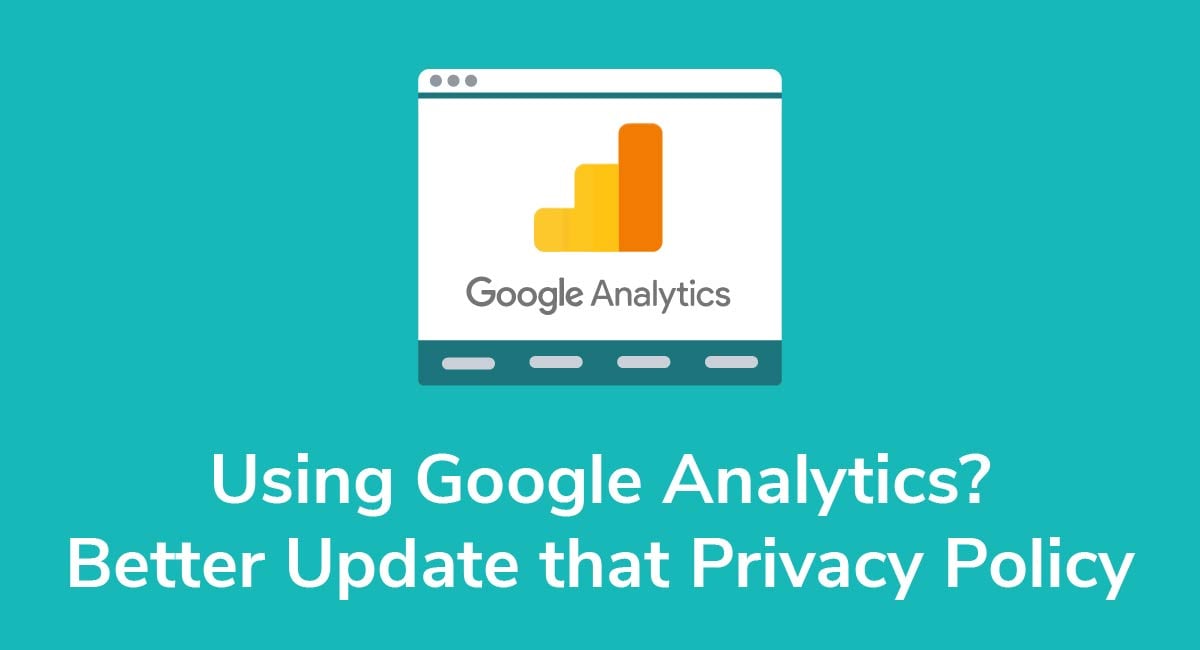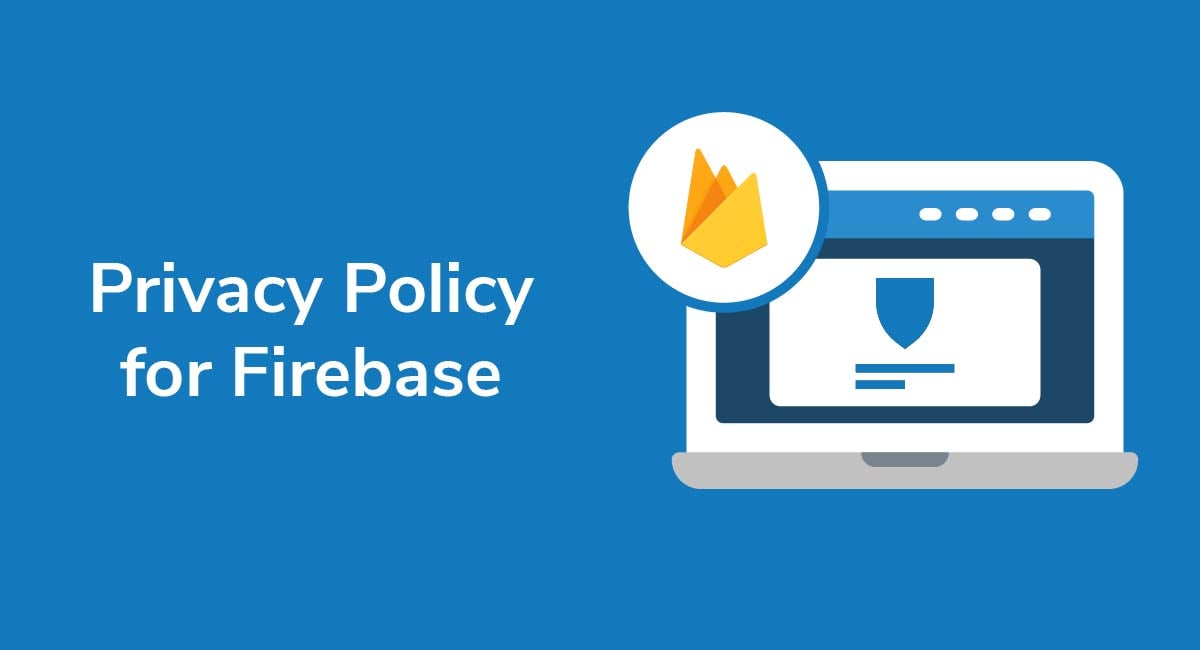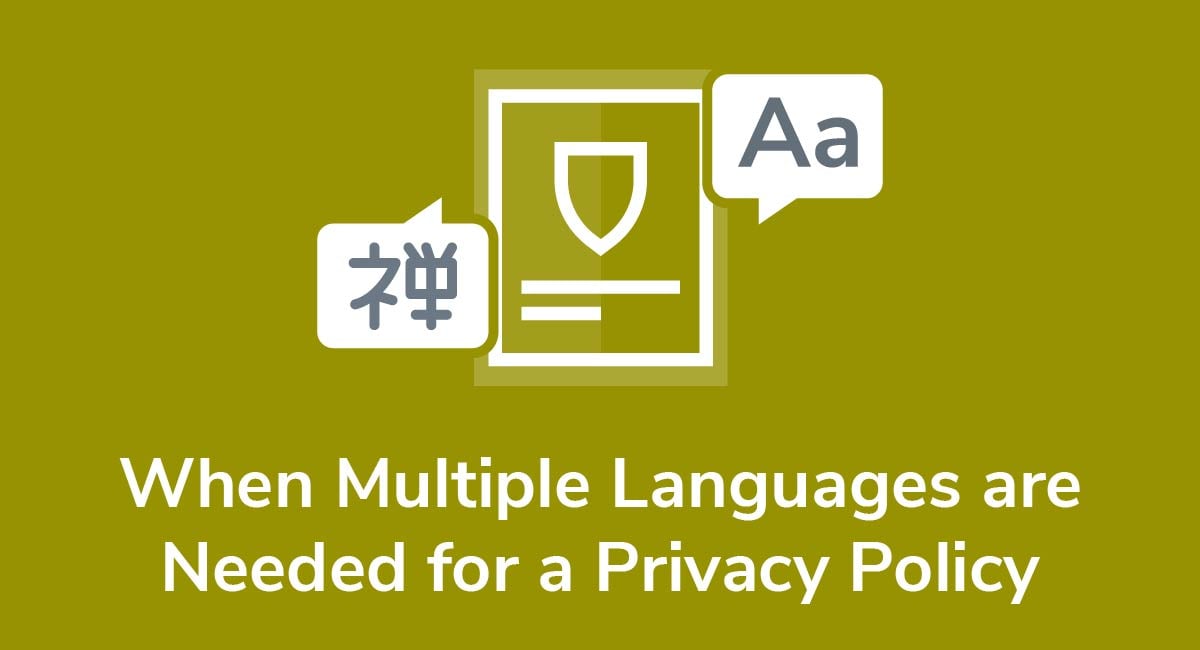Can I Copy a Privacy Policy?
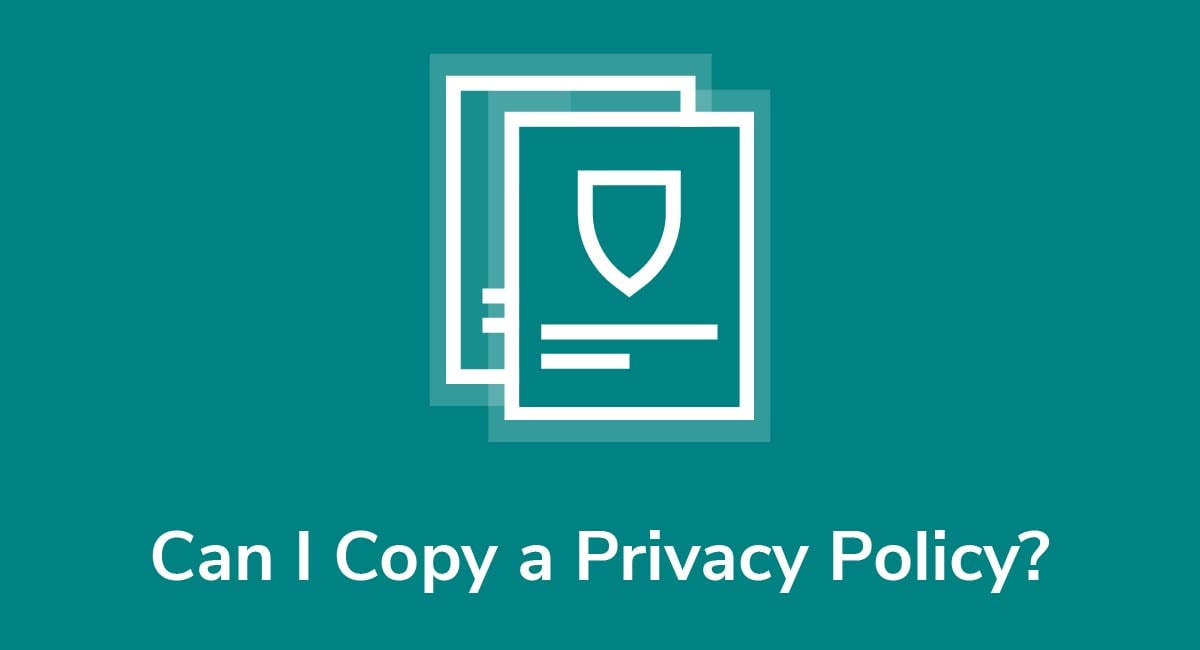
While you technically can copy a Privacy Policy, it's generally a bad idea to do this as you could expose your company to unnecessary legal consequences.
This article will consider five important reasons why you should never copy another Privacy Policy, and offer some tips for writing a unique Privacy Policy that will be tailored to your company's individual needs.
Need a Privacy Policy? Our Privacy Policy Generator will help you create a custom policy that you can use on your website and mobile app. Just follow these few easy steps:
- Click on "Start creating your Privacy Policy" on our website.
- Select the platforms where your Privacy Policy will be used and go to the next step.
- Add information about your business: your website and/or app.
- Select the country:
- Answer the questions from our wizard relating to what type of information you collect from your users.
-
Enter your email address where you'd like your Privacy Policy sent and click "Generate".

And you're done! Now you can copy or link to your hosted Privacy Policy.




- 1. What is a Privacy Policy?
- 2. Do I Really Need a Privacy Policy?
- 3. Why You Shouldn't Copy a Privacy Policy
- 3.1. 1. Breach of Copyright
- 3.2. 2. Compliance Issues
- 3.3. 3. Inaccurate Legal Terms
- 3.4. 4. Failure to Address Actual Business Needs
- 3.5. 5. Damage to Your Reputation
- 4. How Do I Write a Privacy Policy?
- 4.1. Use a Privacy Policy Generator
- 4.2. Use a Privacy Policy Template and Example Clauses
- 5. Conclusion
What is a Privacy Policy?
A Privacy Policy is a legal document that explains how you collect, process and store personal data. It includes information on user rights relating to these things, and other pertinent and specific information about how you handle personal data.
Although the exact requirements vary depending on which privacy laws apply, every Privacy Policy should at a minimum explain:
- What type of data you collect
- Why you collect this data
- What you do with this data
- Who you share the data with
- What privacy rights people have
- How people can exercise those rights
If you'd like a fuller explanation of what Privacy Policies are, read our comprehensive introduction to Privacy Policies.
Do I Really Need a Privacy Policy?

Yes. If your business processes any personal data, even if it's just a visitor's name or IP address, then privacy laws around the world require you to provide a document explaining why you collect that personal information and how it's used.
A Privacy Policy is the simplest and most convenient way to convey this information, and is a best practice.
Here's another reason why you need a Privacy Policy: Your visitors expect you to have one.
Individuals care about their online privacy. By creating a Privacy Policy, you're showing people you understand what matters to them. You're demonstrating your commitment to privacy and online security. In other words, a Privacy Policy can help build trust and encourage people to feel comfortable doing business with you.
To be clear, even if you don't collect any personal information whatsoever, you should still have a Privacy Policy that tells people this.
Why You Shouldn't Copy a Privacy Policy

We're going to look at five main reasons why you shouldn't copy a Privacy Policy, including having copyright and compliance issues, inaccurate content and damage to your reputation.
It's easy to copy another company's Privacy Policy. However, just because you can copy an existing Privacy Policy doesn't mean you should. Let's break down five reasons why it's a bad idea.
1. Breach of Copyright
It could be considered a copyright infringement to copy someone else's Privacy Policy and use it, word-for-word, on your own website.
When someone creates a piece of work, including a written document like a Privacy Policy, it is automatically protected by copyright law. You'll often see businesses assert copyright by including copyright notices on their website or adding disclaimers to their website.
Here is an example from New York University:

Technically, copyright protects creative expression and original works. Since Privacy Policies are all inherently similar, you might argue that they're not "original" content. In the U.S., you might even argue that using someone else's Privacy Policy falls within the definition of "fair use" which allows you to use copyrighted work in a transformative way if you don't take credit for the work.
However, when it comes to fair use, there's a risk that the copyright owner will challenge your use of the content in any way, even if you make enough changes that you're not simply copying it word-for-word. What's more, to rely on fair use, you should be crediting the original creator or at least declaring that you're using the content under fair use provisions.
Privacy Policies are unique to every business. For this reason, if you do copy someone's Privacy Policy, the business owner can request you take it down or they might even sue you for copyright infringement. You can easily avoid these disputes by creating your own Policy or making such substantial changes that it no longer resembles the original Privacy Policy.
2. Compliance Issues
Your Privacy Policy must comply with certain data protection laws determined by factors such as:
- Where your business is based
- What type of data you process, and
- Where your customers are located
For example, maybe your business is located in California but your customers are based around the United States. Not only must your Privacy Policy comply with federal laws, but it must contain certain clauses e.g. the customer's right to opt out of selling personal data.
Some companies such as Walmart even have whole separate policies dedicated to California privacy rights under such laws as the California Consumer Privacy Act (CCPA):
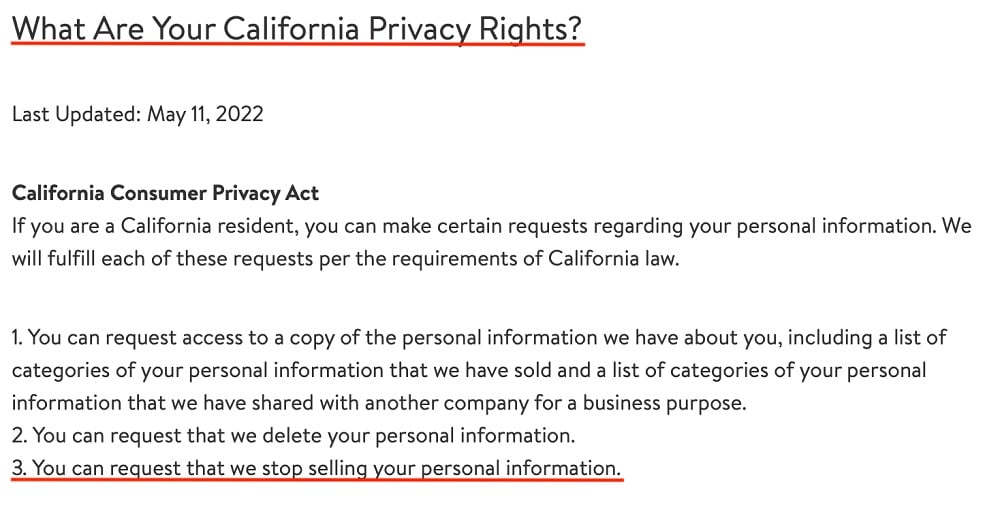
If you copy a Privacy Policy aimed at, for example, an Australian audience, there's a good chance your Policy won't meet the specific legal requirements required of California privacy notices, because compliance rules are different around the world.
As another example, say you're obliged to comply with the EU's GDPR. Your company's Privacy Policy must include a range of clauses including:
- Your legal basis for processing personal data
- The rights people have, for example, the right to be forgotten
- How people can exercise their privacy rights
Here's an example from Gym+Coffee of what such a section might look like:
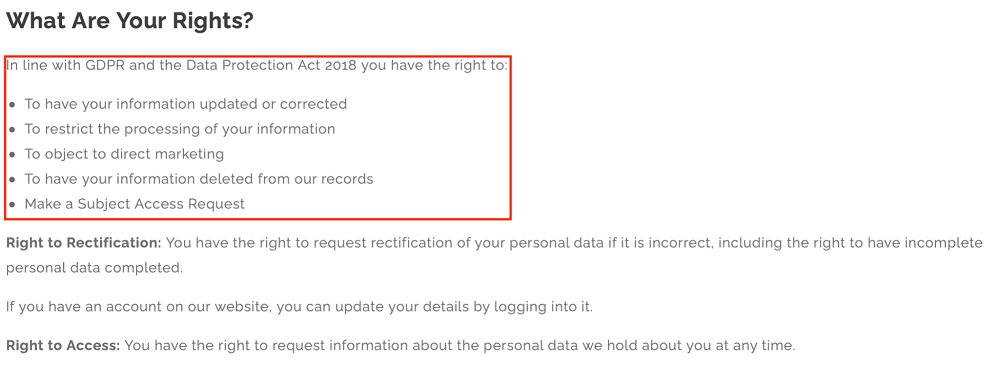
If you just copy another company's Privacy Policy, it may not include all the relevant clauses you will need to comply with these privacy laws. And even if it's aimed at the same audience, there's still a chance some vital information is missing if the company you're copying from missed some requirements.
To help ensure you don't violate privacy laws, write your own Privacy Policy.
3. Inaccurate Legal Terms
As noted above, just because a Privacy Policy looks impressive doesn't mean it's sufficient to meet your compliance requirements. There's also a risk that the Policy is not legally sound, meaning you could actually copy invalid, misleading, or inaccurate clauses and find you can't enforce them at a later date.
For example, maybe you have a dating app or website. You need clauses which address matters such as the data you might collect to verify a user's age and how you stop minors from using your services.
Here's an example of such a clause from dating app Bumble:

If you copy a Privacy Policy for, say, a small retailer, the document most likely won't have clauses covering age restrictions. This means that you'll be left with a Privacy Policy that is legally insufficient and unsound.
In the worst case scenario, even one or two poorly-drafted clauses could invalidate your entire Privacy Policy.
You can avoid this dilemma by using similar Privacy Policies as examples to help you write your own original Privacy Policy.
4. Failure to Address Actual Business Needs
Every business is unique. Your Privacy Policy should reflect your company's specific business model. When you copy someone else's notice, you run the risk of posting a Privacy Policy which simply fails to support your company's actual, specific needs.
Say you're a medical services provider. You have different processing needs, compliance requirements, and privacy considerations than, say, a gaming app developer.
As an example, healthcare businesses often process large volumes of sensitive data such as medical records. You'll need very strict security processes and specific clauses addressing how you handle sensitive data.
Gaming app developers, however, might only collect data such as IP addresses, email addresses, and names. Or if you run a dating app like Bumble, you might collect biometric data for profile verification, and this should be specifically addressed in your Privacy Policy.
Here's how Bumble does this:
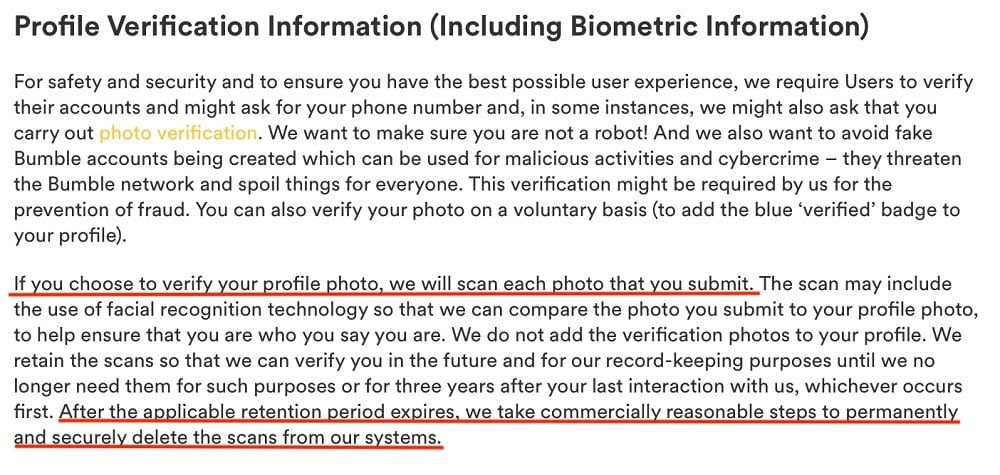
Even if you're in the same industry, you shouldn't simply copy a different company's Privacy Policy since you may have different business models. For example, if you're a very niche retailer with no warehouse, or you're a dropshipper, you have different needs than, say, a multinational corporation, even if you're selling the same exact type of product.
Address the diverse needs of your growing business by generating a Privacy Policy to suit your specific requirements.
5. Damage to Your Reputation
Ultimately, copying another's Privacy Policy could lower your reputation among various individuals including customers, investors, and other business owners. Here are just some of the ways that copying a Privacy Policy could damage your company's brand image.
- People may be less likely to choose your business if they don't feel like you take their privacy seriously. Copying someone else's Privacy Policy does not send a positive message to your target audience.
- If you're sued for copyright infringement, investors may be unwilling to fund your business as they will be concerned about how much it might cost to settle the lawsuit, or if such a costly violation will occur again. You will become a risk versus an asset to investors.
- Other business owners may be reluctant to recommend you or partner with you if you're involved in copyright disputes or there's any concern over your data processing practices. Your reputational damage can trickle over to them.
Whether you're an app developer or you run an online store, there's a huge amount of competition out there. To grow your business and build a loyal customer base, you must do everything possible to create a reputable brand image.
Writing your own Privacy Policy shows how committed you are to building a business based on transparency and professionalism.
How Do I Write a Privacy Policy?

There are two main ways you can create your own Privacy Policy without giving in to the temptation to copy another business's document. The best options here are:
- Use a Privacy Policy generator
- Use a template and other Privacy Policies for example clauses
Let's consider each approach in turn.
Use a Privacy Policy Generator
The easiest way to make your own Policy is using a Privacy Policy generator. All you need to do is submit a few details about your company, and within minutes you can have a legally-compliant, original Privacy Policy tailored to your specific business needs.
The Privacy Policy can be customized depending on which laws you must adhere to. And once you have the basic Privacy Policy, you can add or amend clauses to comply with changing business needs or new privacy laws.
Generators help to simplify compliance so you can focus on running your business rather than worrying about creating a legally comprehensive Privacy Policy.
Use a Privacy Policy Template and Example Clauses
You can use a high quality Privacy Policy template as a starting point to make sure you hit all the required bases. A Privacy Policy template will give you a starting document that you can fill in with your personalized details to help build out the Policy.
You can also take inspiration from existing Privacy Policies to help guide your own drafting.
For example, say you want to list the categories of data you collect from individuals when they visit your website. You might look at other Privacy Policies, like Medium's Privacy Policy, to see how authorative websites lay out this information so that it's accessible and easy to read:
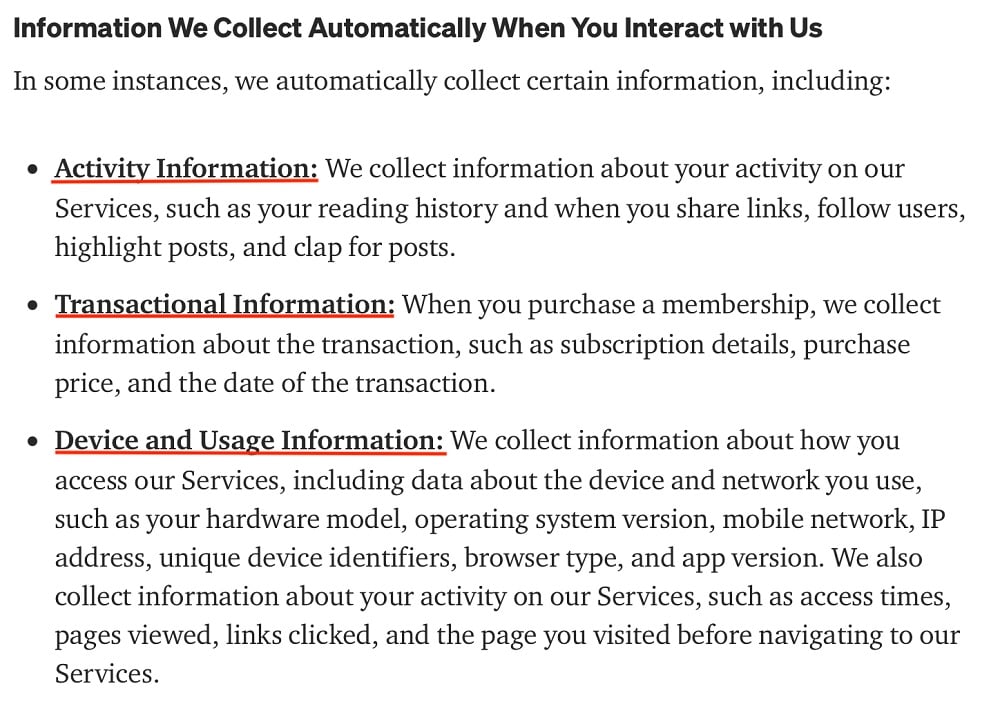
You can take inspiration about the use of bullet points and bold font, as well as get an idea of the scope of what information other businesses are collecting and disclosing.
For another example, say you require all users to be a certain age before they can use your services. In this case you might look to see how similar businesses phrase such a requirement in their Privacy Policy.
Etsy, for example, requires users to be 18 or over, and the company doesn't knowingly sell personal data that belongs to minors. So, you might identify the points Etsy covers in this clause and use them as a compass for writing your own similar clause:
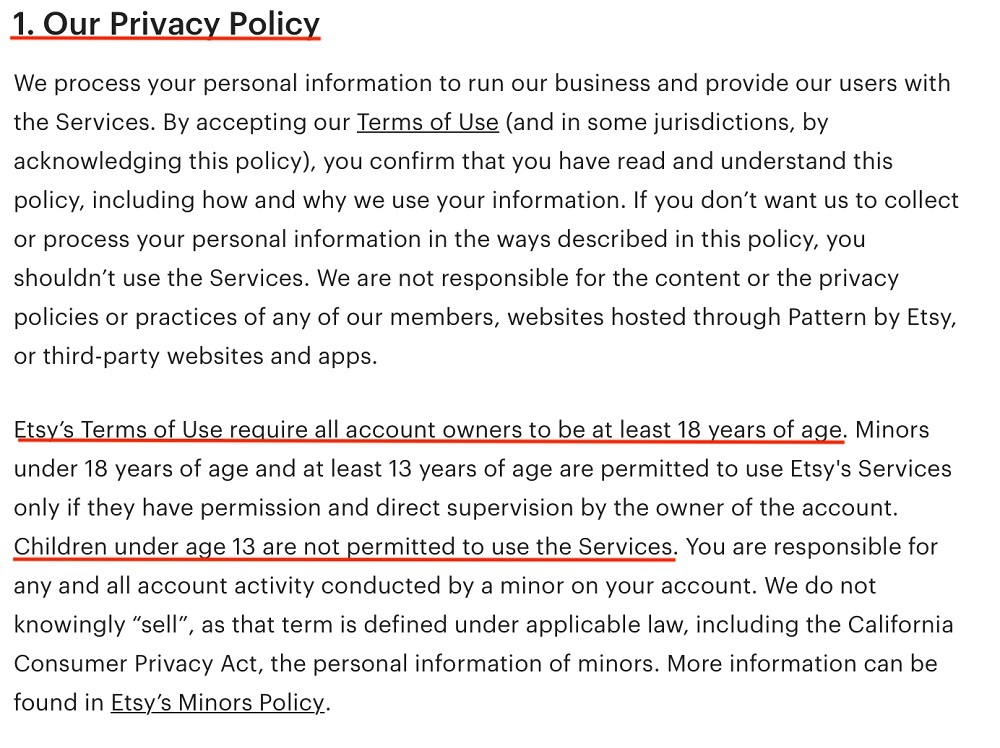
Privacy Policies often contain similar clauses and phrases since they have the same purpose. What's important is that you ensure your Privacy Policy is original and unique to your business, even if it covers similar ground to other businesses in your sector.
Conclusion
While Privacy Policies often contain similar clauses, you should avoid directly copying another company's Privacy Policy. "Copying" in this context includes:
- Taking whole clauses and using them in your Policy without changing any wording.
- Copying the entire document and calling it your own Privacy Policy.
You can read other Privacy Policies for inspiration, so you can get a better idea of what clauses to include, but you should ultimately write your own Privacy Policy and use original language to avoid copyright infringement allegations.
Your Privacy Policy is unique to your business. Not only is it bad practice to copy another company's Privacy Policy, but you could face serious legal repercussions for doing so. What's more, by copying a Privacy Policy, you risk relying on a document that is improperly drafted and does not comprehensively protect your business needs.
If you're unsure how to draft a Privacy Policy, you can use a Privacy Policy generator or template to create a legally compliant Policy, or you can always seek legal advice.
